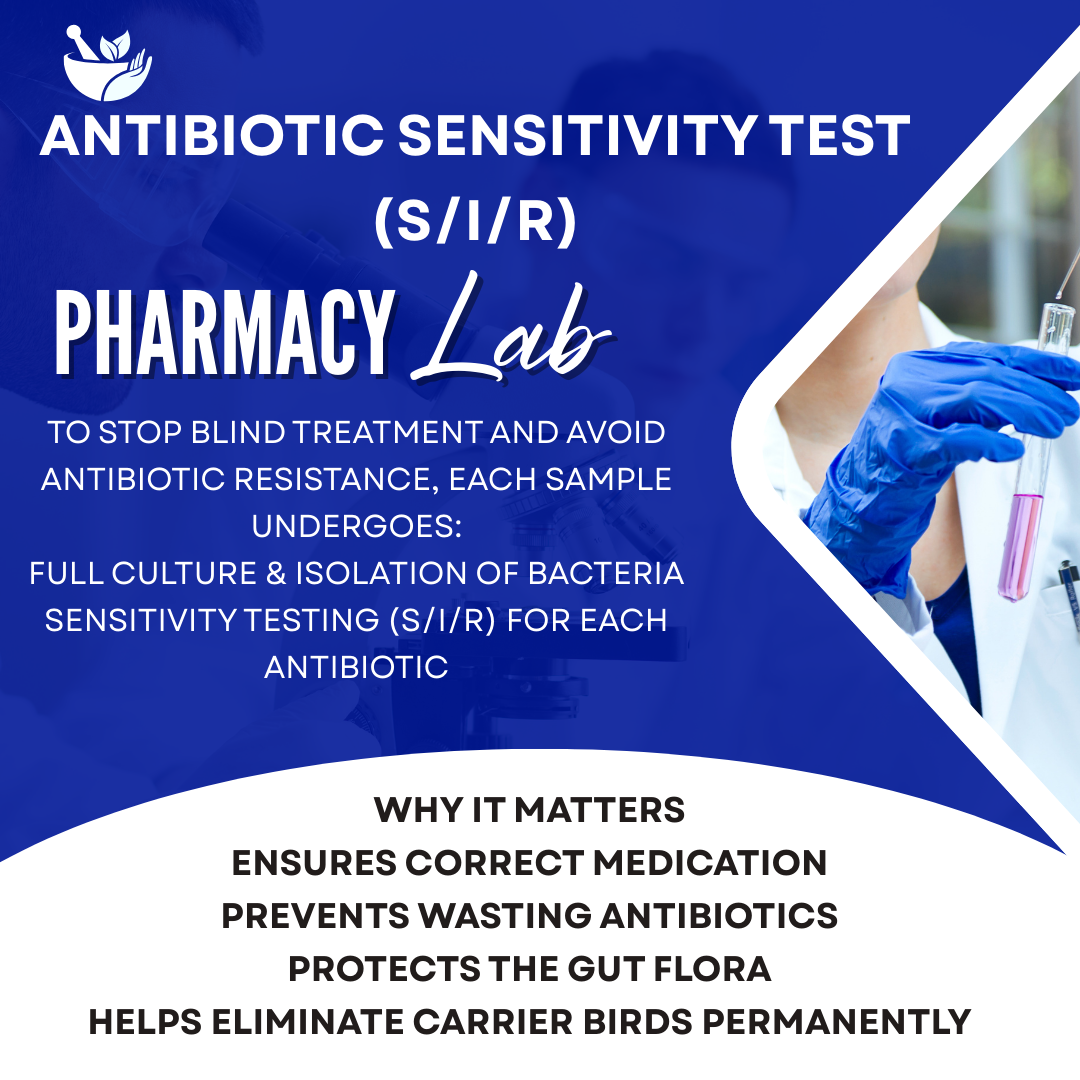My Store
Racing pigeon Antibiotic sensitivity Test also known as a bacterial culture and sensitivity Test
Racing pigeon Antibiotic sensitivity Test also known as a bacterial culture and sensitivity Test
Couldn't load pickup availability
Racing pigeon Antibiotic sensitivity Test also known as a bacterial culture and sensitivity Test.
No need to blind treat , know exactly what antibiotics work in your Pigeon Loft.
An Antibiotic Sensitivity Test (AST), also known as a Bacterial Culture and Sensitivity Test, is a diagnostic procedure used to identify the most effective antibiotic treatment for bacterial infections. In racing pigeons, this test is crucial to ensure that bacterial infections are treated with the appropriate antibiotic, minimizing the risk of resistance and ensuring the health of the pigeons.
Key Steps in the Process:
- Sample Collection:
- A sample is taken from the infected area, which could be from a swab of the throat, crop, faeces, or any other site where infection is suspected.
- Proper collection techniques are essential to avoid contamination and ensure accurate results.
- Bacterial Culture:
- The collected sample is placed on a growth medium and incubated under controlled conditions to allow any bacteria present to grow.
- Different types of media may be used depending on the suspected bacteria.
- After incubation, the colonies of bacteria that have grown are identified.
- Identification of Bacteria:
- The grown bacteria are identified using various biochemical tests, microscopy, or molecular techniques.
- Identifying the specific bacteria helps in selecting the appropriate antibiotics for the sensitivity test.
- Antibiotic Sensitivity Test:
- The identified bacteria are exposed to a range of antibiotics to determine which ones are effective at inhibiting or killing the bacteria.
- This is typically done by placing antibiotic-impregnated discs on a plate where the bacteria have been cultured (disc diffusion method) or by using other methods such as broth dilution.
- Result Interpretation:
- The effectiveness of each antibiotic is observed by measuring the zone of inhibition around the discs (in the disc diffusion method) or other indicators of bacterial growth.
- Results are categorized as Sensitive (S), Intermediate (I), or Resistant (R) to each antibiotic tested.
- Treatment Decision:
- Based on the results, a veterinarian can prescribe the most effective antibiotic to treat the pigeon’s infection.
- The goal is to use the narrowest spectrum antibiotic that will effectively treat the infection, reducing the chances of antibiotic resistance.
Importance in Racing Pigeons:
- Racing pigeons are athletes and are prone to stress-related illnesses, including bacterial infections. Proper and timely treatment is vital for their health and performance.
- Conducting an Antibiotic Sensitivity Test helps in preventing the misuse or overuse of antibiotics, which is crucial for the long-term health of pigeon populations.
This test is an essential tool for veterinarians and pigeon fanciers to ensure that racing pigeons receive the best possible care when dealing with bacterial infections.
How long for results?
The time it takes to get results from a Bacterial Culture and Sensitivity Test for racing pigeons typically depends on several factors, including the type of bacteria and the specific methods used. Here's a general timeline:
- Sample Collection to Culture Growth:
- After the sample is collected, it is incubated to allow any bacteria present to grow. This usually takes 24 to 48 hours.
- Some slow-growing bacteria may take longer, potentially up to 72 hours or more.
- Bacterial Identification:
- Once the bacteria have grown, they are identified using various tests. This identification process generally takes an additional 24 hours.
- If advanced or molecular methods are required, this may take longer.
- Antibiotic Sensitivity Testing:
- After identification, the bacteria are tested against a panel of antibiotics. The sensitivity testing usually takes another 24 to 48 hours.
- This involves incubating the bacteria with the antibiotics and observing the results.
Total Time for Results:
- Typical Turnaround Time: 3 to 5 days from the time the sample is collected to when the results are available.
- Extended Time: In cases of slow-growing bacteria or if additional tests are needed, the total time may extend to 7 days or more.
Immediate Action:
- In critical cases, veterinarians might start treatment with a broad-spectrum antibiotic before the results are available, adjusting the treatment once the sensitivity results are received.
This timeline helps ensure that the pigeons receive the correct treatment as quickly as possible while also allowing for a precise and effective antibiotic regimen.
Share


